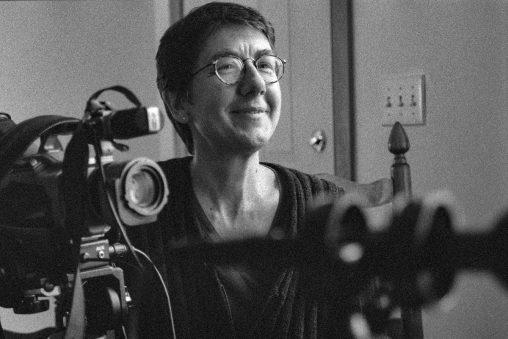
Julia Reichert filming the 2006 documentary “A Lion in the House,” which follows five families across six years as they face and fight childhood cancer. She co-directed the film with Steven Bognar ’86. (Photos courtesy of Steven Bognar ’86 and University Libraries Special Collections and Archives)
By Jen Papadakis
Where are all the women?
Julia Reichert asked this as she scanned the audience of mostly male film students gathered to hear her speak at the Tom Hanks Center for Motion Pictures. It was only three days after her Oscar win for American Factory in 2020, and she was in active treatment for terminal urothelial cancer, a disease she had been battling since 2018.
Her head was bald from chemotherapy treatment and, if she was exhausted from whirlwind travel, she is remembered for not showing it.
She passed the Oscar trophy around the room, encouraging students to hold it and feel its weight. “We did this to make them understand this is attainable,” Reichert
said.
It was not the first time Reichert had asked “Where are all the women?” of a room, an industry, or the world. From the start of her career, she pioneered coverage of working women and women’s struggle for equality.
Several of her films reflect her desire to center the stories and experiences of women. In 1969 she hosted The Single Girl on WYSO. This program is considered by some to be the first openly feminist radio program in the United States.
In 1970, Reichert and Jim Klein created the documentary Growing Up Female, which chronicled the way women are socialized. The film was the first documentary of the modern women’s liberation movement. In 2011, it was added to the Library of Congress National Film Registry.
In 1976, she and Klein made Union Maids, about three women who were key to the early organization of the labor movement, a film also added to the National Film Registry in 2022. In 2020, she and Steven Bognar released 9 to 5: The Story of a Movement, which gave the history of the real-life women’s labor movement.
These are not Reichert’s only films. Her subject matter ranged from feminist stories to stories of substance use, from the history of the American Communist Party to the heartbreak of childhood cancer, from the changing realities of American labor and manufacturing and its effect on a small town to filming behind the scenes with world-famous comedians.
Reichert is remembered for a tenacious commitment to her work, community, and family as well as for her unrelenting belief that collective action and solidarity can inspire social change.
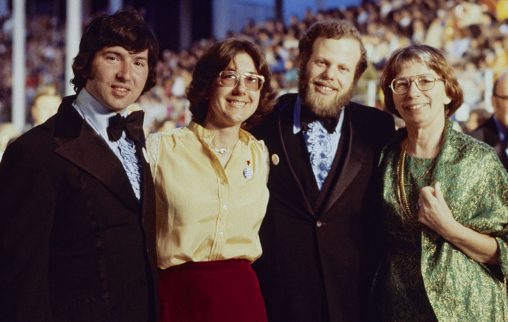
Julia Reichert with co-directors Miles Mogulescu, left, Jim Klein right, and cast member Vicky Starr, far right, at the 1977 Academy Awards, when “Union Maids” was nominated for Best Documentary Feature.
Reichert was a four-time Academy Award nominee, two-time winner of the Prime Time Emmy, and recipient of a national touring retrospective, “Julia Reichert: 50 Years in Film,” which debuted at the Museum of Modern Art in New York.
She was heralded as “the godmother of documentary filmmaking” at her death on Dec. 1, 2022. She was 76.
Hundreds of former students, colleagues, clients, and friends traveled from across the country for a memorial service in Reichert’s beloved village of Yellow Springs on May 6. There, The World House Choir sang “Union Maid” in homage to her 1976 film. It was also a tribute to her role at the “forefront of a new generation of social documentarians…with a belief in film as an organizing tool with a social mission,” as J. Hoberman wrote in her New York Times obituary.
From the outside, it was difficult to see what the diverse group of memorial attendees had in common—a tribute to Reichert’s ability to listen to and value people from all backgrounds and experiences and keep them in her life. Filmmakers from Los Angeles stood next to factory workers from Fuyao Glass America. A woman in a vintage protest T-shirt kindly shared her rumpled tissues with the family next to her.

Wright State motion pictures program students’ field trip to the Citizen Jane Film Festival in 2013.
When asked how they knew Reichert, all of them used the word “friend.”
Selena Burks Rentschler ’03 paid tribute to Reichert’s role in her life, remembering Reichert’s steady devotion to her students in each chapter of her own life, even in the face of her own losses or struggle.
Shortly after the death of her mother, Reichert surprised her students by attending the screening of their films at the Little Art Theatre. “We had flowers just in case she was still able to show up,” Rentschler said. They had a hunch she would.
“Julia was always saying, ‘As filmmakers we have to think about what kind of world we want to live in,’” Neenah Ellis, former executive director of The Eichelberger Center for Community Voices at WYSO, shared with the crowd. “Julia made a life for herself that balanced her career, her family, and her community. She [was] committed—in her photographs, her radio programs, her classroom, her films, and the work-of-art that was her life in Yellow Springs.”
Reichert grew up in Bordentown, N.J., and was one of only a handful of her high school graduating class to attend college. She made her first film as an undergraduate student at Antioch College and from that point on devoted her life to filmmaking, storytelling, and educating future generations of filmmakers.
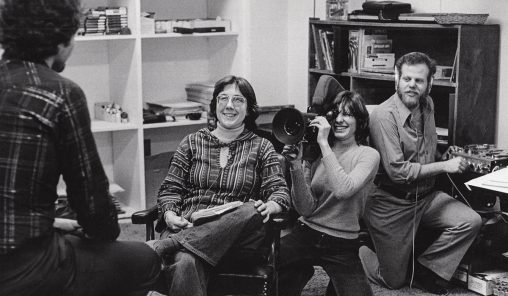
Julia Reichert, Alicia Weber, and co-director Jim Klein on a shoot for their 1974 documentary “Methadone: An American Way of Dealing.”
Reichert perfected the art of storytelling and listening, with an expert eye for stories that captured the social issues plaguing the Midwest region she devotedly called home. “We had a special ear to the heart of America,” she said of her spouse and filmmaking partner, Steve Bognar. “You don’t just dive in and out. You sit with people, at the bar, at their kitchen table, at their bedside. You have to commit.”
Reichert helped lay the foundation for Wright State’s motion pictures program near its inception, joining the faculty ranks with her then-husband and longtime filmmaking partner, Jim Klein. Her focused commitment to her students’ careers paved uncharted paths to national and international success for Wright State graduates over her 28-year tenure.
She is heralded for her intentional pedagogy cemented in apprenticeship and enlisted many of her former students to work with her on her films, an opportunity that would arguably have been a further reach for Midwestern students had she not been so devoted to the Miami Valley and the talent she saw and nourished around her.
Her equal devotion to the growth of her students, commitment to evolving her best-in-class practice, and quest for excellence drove decades of success and helped the motion picture program receive national recognition. Many of Reichert’s former students are prestigious, award-winning names in film and committed artisans of their craft, carrying on the example of their mentor.
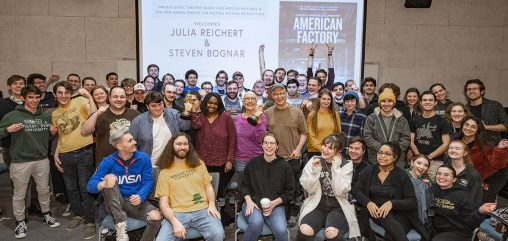
Julia Reichert and Steven Bognar ’86 visited the Tom Hanks Center for Motion Pictures to celebrate their 2020 Oscar win with Wright State students and faculty members.
Reichert’s students included Academy Award winner Hannah Beachler ’05, Karri O’Reilly ’98, Nicole Riegel ’09, Sherman Payne ’04, and Erik Bork ’89. In addition to her tenure at Wright State, Reichert taught courses at Antioch College and American University and was a guest lecturer at Harvard and Yale.
Reichert was buried in Woodland Cemetery in Dayton. In addition to Antioch, a memorial ceremony took place in New York City.
Reflecting on Julia Reichert’s influence
“She was a champion of women and loved film. She took us rag-tag kids and helped shape us all into filmmakers and storytellers.”
—Hannah Beachler ‘05, Academy Award-winning production designer, Black Panther, Creed, and Beyoncé’s visual album Lemonade
“Julia Reichert was such a rare talent, a rare colleague and friend. Julia lives on in her films, and each one stands as a testament to the human spirit, with profound insight into the human condition. She was one of those rare people—and I hear this from all of those who knew her—who, when you were with her, was totally in your presence, as you were in hers. She, as much or more than anyone I’ve ever known, was an authentic people person; always in the moment, listening, learning, and loving.”
—W. Stuart McDowell, Former Chair, Department of Theatre, Dance, and Motion Pictures
“Julia was the first person who really believed in and supported me as a potential storyteller, pushing me to stretch beyond my self-imposed limits to rise up to higher levels. Having her as a teacher meant having a lifelong advocate and friend who helped you however she could and cared deeply about what you were doing while inspiring you with what she was creating in the world. Her natural curiosity, engagement, intelligence, and goodwill made her the ideal conversation partner, and over the 38 years since I met her, she’s played an outsized role as one of a handful of the most positively impactful people in my life.”
—Erik Bork ’89, Two-time Emmy- and Golden Globe-winning writer/producer
“The enormity of Julia’s contribution to film history and the Ohio film community is matched only by how deeply everyone she impacted is grieving her loss. Julia was my teacher, mentor, and friend for over 30 years. She laid a strong foundation for our close-knit MoPix alum community, and we will forever be grateful.”
—Nichol Simmons, Sundance Film Festival winner and former motion pictures program adjunct faculty member
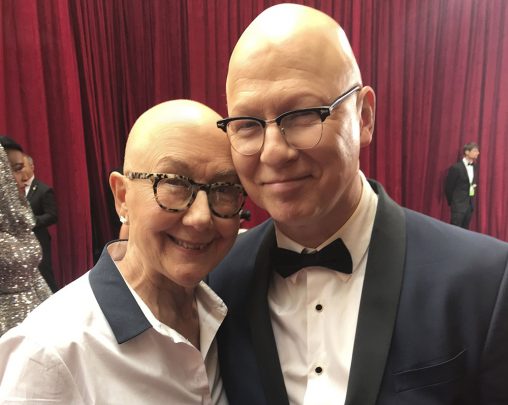
Bognar and Reichert at the 2020 Academy Awards, at which they won an Oscar for “American Factory” in the Best Documentary Feature category.
To support Julia Reichert’s passion for independent filmmaking at Wright State, please visit wright.edu/give/mopixfund.
This article was originally published in the fall 2023 issue of the Wright State Magazine. Read more stories at wright.edu/magazine.


 Wright State alum Lindsay Aitchison fulfills childhood space-agency dream
Wright State alum Lindsay Aitchison fulfills childhood space-agency dream  Wright State business professor, alumnus honored by regional technology organizations
Wright State business professor, alumnus honored by regional technology organizations  Wright State University Foundation awards 11 Students First Fund projects
Wright State University Foundation awards 11 Students First Fund projects  Gov. DeWine reappoints Board Treasurer Beth Ferris and names student Ella Vaught to Wright State Board of Trustees
Gov. DeWine reappoints Board Treasurer Beth Ferris and names student Ella Vaught to Wright State Board of Trustees  Joe Gruenberg’s 40-Year support for Wright State celebrated with Honorary Alumnus Award
Joe Gruenberg’s 40-Year support for Wright State celebrated with Honorary Alumnus Award 